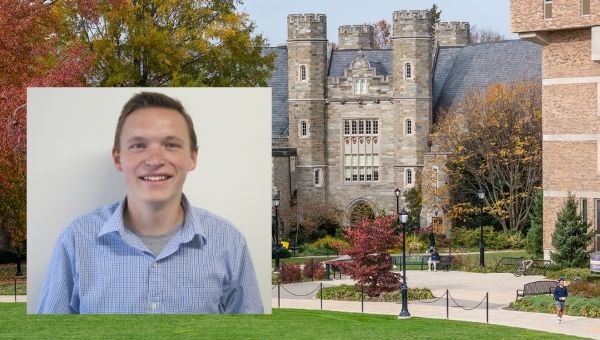Experiential Learning Enables Students to Contribute to Community Solutions
 Distinct from traditional internships, the student learning experiences that are coordinated
by the University’s Center for Community Solutions (CCS) connect regional organizations, businesses, and municipal entities with students
whose unique knowledge, skills, and abilities qualify them for specific projects.
Distinct from traditional internships, the student learning experiences that are coordinated
by the University’s Center for Community Solutions (CCS) connect regional organizations, businesses, and municipal entities with students
whose unique knowledge, skills, and abilities qualify them for specific projects.
As evident in the center’s name, its purpose is to meet community needs, from marketing and public relations plans for non-profits to statistical analysis for a township or county office. These project-based, community-engaged learning experiences enable students to apply their knowledge and skills while community partners complete objectives with assistance they otherwise would not have, and at no cost to them.
The CCS’ 2020–2021 annual report notes that, from July 2020 through June 2021, the center responded to 22 organizations’ requests for assistance from WCU.
Julie Dietrich, CCS director and executive director of WCU’s Office of External Relations, matches the student to the community need. Faculty reach out to her when they want to find regionally impactful projects for talented students and community partners contact her with specific needs. She has networked with various University offices and works closely with faculty to create and oversee projects.
Jennifer Rossi Long ’05, senior director of WCU’s Twardowski Career Development Center, appreciates this collaboration, in part because her office manages external relationships with employers. “The ability to offer unique yet complementary solutions for employers looking to connect with students for meaningful projects and experiences is valuable. It’s great to be able to seamlessly connect an employer with a variety of opportunities to engage the campus in partnership with the Center for Community Solutions.”
Graduate student Mark Davie notes how the CCS projects align with his work in the Master of Urban and Regional Planning, the degree he will complete in December 2022. Dottie Ives Dewey, chair of WCU’s Geography and Planning Department and a professor of planning, first reached out to him when Dietrich promoted a 10-week CCS assignment to conduct a planning analysis for the YMCA last summer. With that on his resume, Davie is now assisting Chester County’s Department of Community Development in a year-long project to map social factors and commuter patterns in 73 municipal districts as part of CDC’s housing-related initiatives.
Benjamin Naroden has applied his skills in his dual major areas, communication studies and psychology, working with Mother Compost and the West Chester Friends Association for the Care and Protection of Children through the CCS. He helped publish digital media, host public events, and contributed to their respective mission and vision statements. “CCS built a mutually beneficial connection between myself and a local business,” he said of his work with the Mother Compost project. Naroden will graduate this May.
A marketing major on track to graduate in May 2024, Emily Gowman helped the West Chester Business Improvement District (BID) map current property vacancies as well as properties for sale or lease in the borough, and helped identify businesses interested in relocating to the District. She is now considering double majoring in geography in the Geographic Information Systems (GIS) track.
While students are compensated for their CCS project-based experience, most traditional internships are unpaid, which poses a problem for some students, notes the Career Development Center’s Rossi Long. “Many of our major programs require internships in order to graduate,” she says, but students whose work schedule or transportation situation prevent them from taking an internship sometimes change majors because they can’t meet that requirement. Employers can lose, too, as interns are potential hires.
To address students’ financial barriers, she and others on campus and at the WCU Foundation piloted a Fund for Unpaid Internships program, managed through Rossi Long’s office. Begun last fall, the program has so far helped 19 students achieve their internship goals during this academic year.
For more information on the Fund for Unpaid Internships, contact the Career Development Center: cdc@wcupa.edu.
Visit the Center for Community Solutions website for information on community partnerships.
